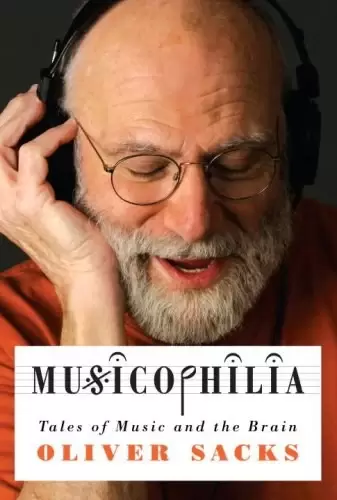
作者:OliverSacks
出版社:KnopfPublishingGroup
副标题:TalesofMusicandtheBrain
出版年:2007-10-16
页数:400
定价:GBP9.99
装帧:Hardcover
ISBN:9781400040810
内容简介
······
Music can move us to the heights or depths of emotion. It can persuade us to buy something, or remind us of our first date. It can lift us out of depression when nothing else can. It can get us dancing to its beat. But the power of music goes much, much further. Indeed, music occupies more areas of our brain than language does—humans are a musical species.
Oliver Sacks’s compassionate, compelling tales of people struggling to adapt to different neurological conditions have fundamentally changed the way we think of our own brains, and of the human experience. In Musicophilia, he examines the powers of music through the individual experiences of patients, musicians, and everyday people—from a man who is struck by lightning and suddenly inspired to become a pianist at the age of forty-two, to an entire group of children with Williams syndrome, who are hypermusical from birth; from people with “amusia,” to whom a symphony sounds like the clattering of pots and pans, to a man whose memory spans only seven seconds—for everything but music.
Our exquisite sensitivity to music can sometimes go wrong: Sacks explores how catchy tunes can subject us to hours of mental replay, and how a surprising number of people acquire nonstop musical hallucinations that assault them night and day. Yet far more frequently, music goes right: Sacks describes how music can animate people with Parkinson’s disease who cannot otherwise move, give words to stroke patients who cannot otherwise speak, and calm and organize people whose memories are ravaged by Alzheimer’s or amnesia.
Music is irresistible, haunting, and unforgettable, and in Musicophilia, Oliver Sacks tells us why.
作者简介
······
Oliver Wolf Sacks, CBE, was a British neurologist residing in the United States, who has written popular books about his patients, the most famous of which is Awakenings, which was adapted into a film of the same name starring Robin Williams and Robert De Niro.
Sacks was the youngest of four children born to a prosperous North London Jewish couple: Sam, a physician, and Elsie, a surgeon. When he was six years old, he and his brother were evacuated from London to escape The Blitz, retreating to a boarding school in the Midlands, where he remained until 1943. During his youth, he was a keen amateur chemist, as recalled in his memoir Uncle Tungsten. He also learned to share his parents' enthusiasm for medicine and entered The Queen's College, Oxford University in 1951, from which he received a Bachelor of Arts (BA) in physiology and biology in 1954. At the same institution, he went on to earn in 1958, a Master of Arts (MA) and an MB ChB in chemistry, thereby qualifying to practice medicine.
After converting his British qualifications to American recognition (i.e., an MD as opposed to MB ChB), Sacks moved to New York, where he has lived since 1965, and taken twice weekly therapy sessions since 1966.
Sacks began consulting at chronic care facility Beth Abraham Hospital (now Beth Abraham Health Service) in 1966. At Beth Abraham, Sacks worked with a group of survivors of the 1920s sleeping sickness, encephalitis lethargica, who had been unable to move on their own for decades. These patients and his treatment of them were the basis of Sacks' book Awakenings.
His work at Beth Abraham helped provide the foundation on which the Institute for Music and Neurologic Function (IMNF), where Sacks is currently an honorary medical advisor, is built. In 2000, IMNF honored Sacks, its founder, with its first Music Has Power Award. The IMNF again bestowed a Music Has Power Award on Sacks in 2006 to commemorate "his 40 years at Beth Abraham and honor his outstanding contributions in support of music therapy and the effect of music on the human brain and mind".
Sacks was formerly employed as a clinical professor of neurology at the Albert Einstein College of Medicine and at the New York University School of Medicine, serving the latter school for 42 years. On 1 July 2007, Columbia University College of Physicians and Surgeons appointed Sacks to a position as professor of clinical neurology and clinical psychiatry, at the same time opening to him a new position as "artist", which the university hoped will help interconnect disciplines such as medicine, law, and economics. Sacks was a consultant neurologist to the Little Sisters of the Poor, and maintained a practice in New York City.
Since 1996, Sacks was a member of The American Academy of Arts and Letters (Literature). In 1999, Sacks became a Fellow of the New York Academy of Sciences. Also in 1999, he became an Honorary Fellow at The Queen's College, Oxford. In 2002, he became Fellow of the American Academy of Arts and Sciences (Class IV—Humanities and Arts, Section 4—Literature).[38] and he was awarded the 2001 Lewis Thomas Prize by Rockefeller University. Sacks was awarded honorary doctorates from the College of Staten Island (1991), Tufts University (1991), New York Medical College (1991), Georgetown University (1992), Medical College of Pennsylvania (1992), Bard College (1992), Queen's University (Ontario) (2001), Gallaudet University (2005), University of Oxford (2005), Pontificia Universidad Católica del Perú (2006). He was appointed Commander of the Order of the British Empire (CBE) in the 2008 Birthday Honours. Asteroid 84928 Oliversacks, discovered in 2003 and 2 miles (3.2 km) in diameter, has been named in his honor.
评论 ······
前几章觉得和自己的期待不一样,为什么都是关于音乐在各种奇怪的病症中的体现。但越往后越感动,无论那些人的大脑多么受损,多遥远的难以理解的症状,或者是多不可思议的天才,音乐让所有生命依然有情,牵住一个个多样的人类自然锚在地球上,在人间。
罗列了一些和音乐感知有关病例事例,没有分析的很深,且例子都比较早,还凑合吧
翻了一会中文版发现翻译实在是太惨就看了英文版,发现完全不是一回事。非常好看,看完了之后对作者充满了好奇,如果哲学还是亚里士多德、休谟那个意义上对世界的探究的话,那sacks就是一名不折不扣的哲学家。sacks所做的工作也一定是休谟想做而不可能做到的工作,inquiry concerning human undrestanding.
from the neuropsychology perspective
评论前必须登录!
注册